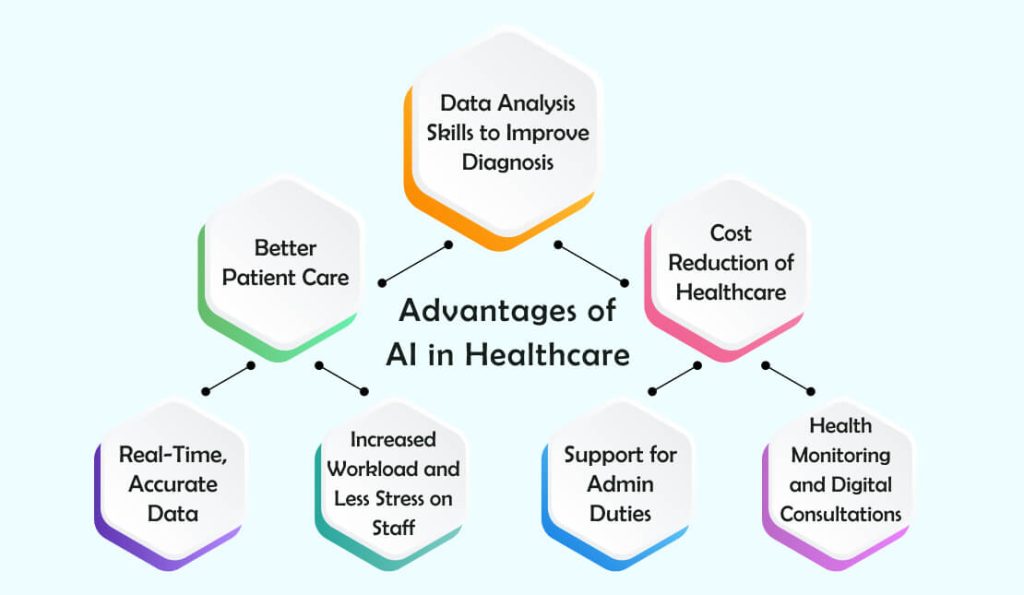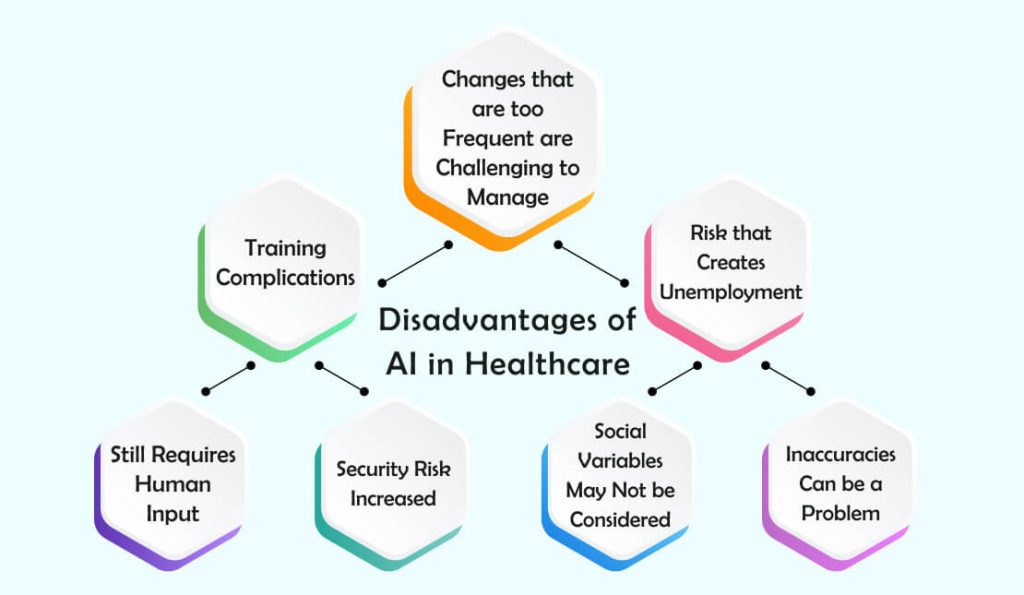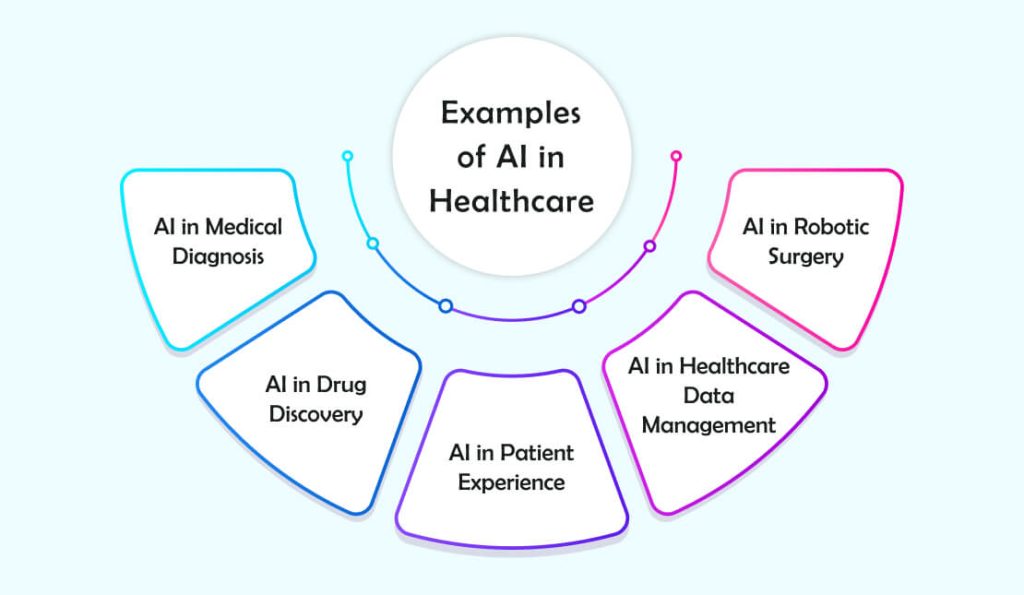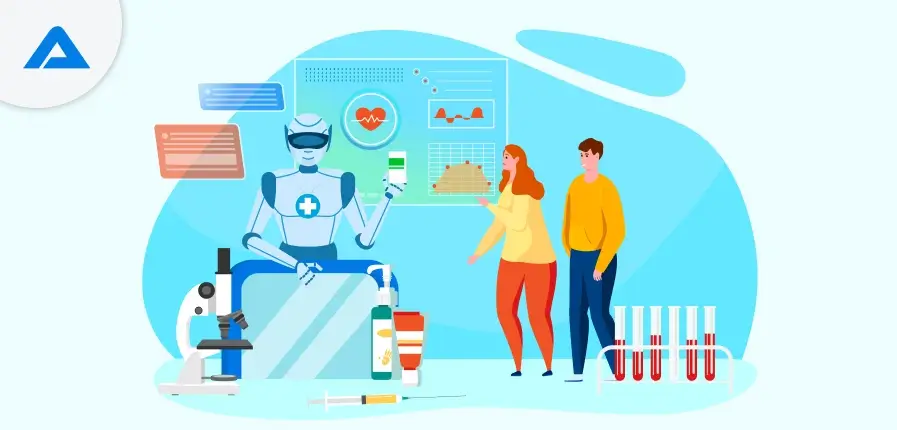We humans have travelled a long journey in search of a better comprehension of AI. From the very beginning of digitalization in the early days of mainstream media, they taught us that Artificial Intelligence was an extremely complex mechanism meant to overcome human life’s challenges, provide the secrets of the universe, initiate or stop a global catastrophe, and do other major things.
However, reality proved to be much simpler. Modern neural networks are a bit different from the AI image we’re accustomed to. However, the effects of this technology are far more important than the majority of us realize.
Of course, most people still believe artificial intelligence is awful from Terminator movies, rather than their everyday social network feed or high-end picture generator. What about more difficult instances like those of the medical and pharmaceutical industries? As the niche industry becomes increasingly digitized the use of AI within the pharmaceutical industry increases in size and the depth.
We have reviewed the most recent survey and now are eager to share our findings with you. This article will discuss the most significant sectors of AI’s impact on the pharmaceutical industry, such as customized healthcare manufacturing, drug discovery clinical trials, and content operations.
What Is AI in Healthcare?
AI in healthcare concerns using machine learning, natural language processing, deep learning, and various AI technologies to improve the quality of life for healthcare experts and patients. The data-processing predictive capabilities of AI health professionals allow them to use more of their resources and adore more proactive approaches to different aspects of health care.
With these advancements, doctors can provide faster and more accurate diagnoses. In contrast, health professionals are able to access electronic health records more quickly, and patients get more prompt and customized treatment.
Pros and cons of AI within Healthcare
It’s important to be familiar with the advantages and disadvantages of implementing AI within the healthcare industry in order to understand its importance in healthcare settings.
Advantages of AI in Healthcare

Data Analysis Skills to Improve Diagnosis
In the case of medical records and other health-related information, AI technology can process it more quickly and usually more accurately than human beings can. This helps medical professionals identify problems faster and fulfill their duties more efficiently.
Better Patient Care
If it is appropriately implemented, AI in healthcare should improve patient care.
This is achieved by reducing the time spent on research, making it easier to use resources more effectively, and decreasing mistakes.
Incorporating medical AI into clinicians’ workflow could provide healthcare professionals with valuable information when making crucial treatment decisions.
Cost Reduction of Healthcare
There are many ways AI can help reduce costs both time-wise and financially. Machine learning in healthcare could reduce the time spent on administrative tasks, decrease medical errors, and finish tasks much faster than a human capable of.
Real-Time, Accurate Data
In the case of medical concerns, it’s crucial to provide a diagnosis as soon as possible. To achieve this, medical professionals must obtain precise information that allows them to make vital decisions with greater efficiency.
The use of real-time information reduces costs and waiting time and gives a better chance of preventing the condition from worsening.
Increased Workload and Less Stress on Staff
It’s not a secret that working in healthcare can be extremely demanding, and departments frequently face staff shortages. Artificial intelligence in healthcare can assist in solving this problem and take on some of the burdens to reduce stress.
The demands of busy schedules and stress from personal life can influence the quality of care offered, which can be another cause for the mental health of staff, which is vital.
Support for Admin Duties
Reduced time spent on administrative tasks means medical professionals can concentrate more on patient care and crucial areas of their jobs—the tasks AI can aid in maintaining documents, scanning analysis, or data entry.
Health Monitoring and Digital Consultations
Wearable technology that assists in monitoring a patient’s health or virtual consultations that can be conducted on a smart gadget, AI is an excellent method of improving how doctors document and analyze information. Patients can also keep track of their health and seek expert help on the internet.
Disadvantages of AI in Healthcare

Training Complications
Medical professionals require extensive training to use a variety of AI technologies, and AI tools themselves need to be trained using carefully curated data to function correctly. Both of these could lead to problems that would not have been present without the advent of AI.
Risk that Creates Unemployment
The robots are on the way! In the past, it was commonly made fun of the idea that robots could take over the world and take our jobs. However, AI and automation actually present a serious danger to a variety of industries. Healthcare is not an exception, and the advent of AI could cause a variety of administrative positions to become redundant.
Changes that are too Frequent are Challenging to Manage
Whatever the field changes, too much of it can be highly disruptive. That’s why it’s essential to find a balance and ensure that departments are prepared to take advantage of AI before it’s implemented.
This is crucial in the field of healthcare, where crucial decisions could mean the difference between life and death. Healthcare professionals must be certain that AI is used effectively and that staff members are aware of how medical technology functions.
Still Requires Human Input
AI has made the rise in the field of healthcare, but the human factor and its surveillance are still a requirement. Humans are special in that they can detect the behavioural patterns of others and sympathize with patients in ways that machines cannot. Sometimes, such findings can be vital in medical diagnosis and help prevent issues.
Security Risk Increased
AI systems are susceptible to security threats that pose a massive issue for healthcare professionals since the patient’s information must remain private.
Cyberattacks are becoming more sophisticated and accurate but harder to prevent and predict. Healthcare institutions must invest significant money to keep cybercriminals in check.
Social Variables May Not be Considered
When it comes to treating patients, it’s usually not solely about physical issues. In reality, social, historical, and economic factors could also affect the care that one needs for their particular situation.
Although AI is capable of assigning treatment according to a medical diagnosis, it is not yet able to consider other social factors that might affect a doctor’s choice.
Inaccuracies Can be a Problem
Utilizing AI in medicine could eliminate many human-made errors, but it will not be able to rid the world of errors completely.
If a massive quantity of data needs to be analyzed, errors may occur. Data gaps could also cause problems, which could result in grave consequences in fields like medical prescription.

Develop Superior Health Tech Solutions With AddWeb Solution. Get your healthcare software to market faster with product-minded engineers.

Pooja Upadhyay
Director Of People Operations & Client Relations
Step-by-Step AI in Healthcare Software Development
Follow these to develop smart healthcare software solutions that foster creativity and improve efficiency.
Determining the Requirements
You should identify the problems you face as a healthcare professional and determine how healthcare software development could provide the solution. Before working with an AI programmer, you must clearly understand your goals. Only after you’ve identified your goal can you successfully invest in a health app development project.
In-Depth Research and Competitor Analysis
When the necessity for developing healthcare AI software is determined, thorough research is essential. Choosing an experienced AI development company to assist with the study is possible. You may also opt to look at the offerings of your competition to determine what AI-driven strategies they are using.
Look for a Reliable AI Development Company
Locating the most suitable healthcare software development company that can utilize experienced developers to work on your project is the most important second step in developing AI Software. If you opt for an in-house team, you’ll be faced with the long procedure of interviewing, hiring, and educating the full-time developer who will fulfill your requirements.
The budget will also increase, and the time frame for developing AI healthcare software solutions will be extended. Thus, hiring committed mobile developers with a trusted AI software development firm is the best option.
Algorithm Development and Training Models
Your healthcare mobile app team of developers will select algorithms based on the information type and the task’s difficulty level. The healthcare software solutions provider you choose to work with will utilize standard algorithms like convolutional neural networks (CNN), recurrent neural networks (RNNs), and support vector machines (SVMs).
After deciding on the algorithm, the next step is constructing deep or machine-learning models. The model’s structure must be created, and the firm that develops apps must choose the right layers and connections and define the output and input structures.
The models used for developing healthcare software solutions should be trained with a large amount of health-related information. This data can include information about the patient’s demographics and electronic health records, as well as other important information.
Integration, Rigorous Testing, and Deployment
The healthcare application development company will finish the integration, enabling an encapsulated data transfer between the AI-driven software and your current health technology.
After the application has been implemented, it’s time to test the AI software thoroughly to ensure that it runs without issue. Artificial intelligence experts offer automated and human tests to prove the software’s accuracy.
After testing, you and your AI application development team will determine that the developed healthcare AI solutions have fulfilled its intended purpose, and they’ll use the solution.
Monitoring and Continuous Enhancement
It is vital to know how AI software development for healthcare functions. It is important to select an agency for custom healthcare software development that offers post-customized support and continually monitors your product’s operation. Collecting feedback and making necessary changes to the AI-based health application can ensure the continued success of your app.
Examples of AI in Healthcare

To help you become more knowledgeable about this rapidly changing field, we have compiled several examples and use cases for AI in healthcare.
AI in Medical Diagnosis
Each year, 400,000 hospitalized patients are at risk of injuries, and 100,000 die. Given that, the potential for improving the process of diagnosing patients is among AI’s most intriguing healthcare applications. A lack of medical history and many cases can result in fatal human mistakes. Insensitive to such variables, AI can identify and treat diseases at a much faster pace than the majority of medical experts.
AI in Drug Discovery
The drug industry is being weighed down by the escalating costs of healthcare development services that require many human days. Conducting every product through clinical testing can cost around $1.3 billion, yet less than 10% of products are brought to market. Because of technological advances, AI is speeding up this process by assisting in the design of drugs, predicting side effects, and identifying the best patients for trials.
AI in Patient Experience
AI can be utilized to enhance digital communication and schedule reminders, customized health advice, and suggestions for patients’ next steps. AI’s capability to assist in diagnosing health problems also enhances the efficiency and precision of patient visits, resulting in quicker and more customized treatment. In addition, the seamless patient experience enables doctors, hospitals, and clinics to see more patients every day.
AI in Healthcare Data Management
Important information may be lost in the forest of billions of information points. In addition, the inability to connect crucial data points can hinder the development of new medicines or preventative treatments and an accurate diagnosis. Due to its capacity to manage massive amounts of data, AI can break down the silos of data and link in a matter of minutes data that would otherwise take many years to process. This will reduce the time and cost of healthcare administration, leading to improved efficiency in daily operations and patients’ experiences.
AI in Robotic Surgery
Hospitals employ AI and robots to assist in everything from minimally invasive techniques to open-heart surgeries. The surgeon can operate the robot’s mechanical arms while sitting at a computer’s console, and the robot offers the doctor an enhanced, three-dimensional view of the surgery site. The surgeon can then direct others on the team to collaborate with the robot. Robot-assisted surgeries have resulted in fewer complications related to surgery, less suffering, and a shorter recovery time.

Future and Potential of AI in the Healthcare Industry
Below we will look at certain areas in which AI application in health care was not previously considered, particularly access to healthcare.
Multi-Omic Technologies and Precision Medicine
Multi-omics technologies are used to collect and analyze data from many sources, including genomics epigenomics, microbiomics and proteomics, metabolomics, and phenomics etc- and then synthesizing the information by using AI techniques like Deep Learning for pattern recognition to give healthcare professionals with a method to understand the molecular basis of diseases better and to facilitate precision medicine practices.
Genomics and AI
AI can analyze genome data to identify genetic predispositions to disease. It can also determine disease progression and choose effective treatments according to an individual’s DNA profile, resulting in highly customized treatment plans and targeted therapies.
Proteomics and Metabolomics
Integrating metabolomic and proteomic data using AI could reveal biomarkers and interactions between proteins and metabolic pathways relevant to diseases, aiding researchers in developing new diagnostic tools or treatments.
Digital Solutions for Healthcare
The demand for healthcare is growing for continuous healthcare services. Digital health care IT solutions made possible by artificial intelligence are an effective solution to that need. Let’s take a look at some of the examples below.
Telemedicine and Remote Patient Monitoring
Telemedicine is crucial in delivering high-quality healthcare services, and its importance can’t be overstated. AI healthcare software solutions used in remote devices to monitor patients do not just allow virtual consultations that include diagnostic capabilities but also continuously analyze and collect health information, prompting medical professionals to report any abnormalities that occur.
Mobile Applications for Health (mHealth)
AI-powered mHealth applications can analyze users’ health, including exercise routines, food habits, vital signs, and nutrition, to give personalized health suggestions that encourage healthier lifestyles and health prevention.
Virtual and Augmented Reality (VR/AR) Provide Unique Opportunities.
VR and AR technology powered by AI allow realistic medical simulations to train healthcare professionals. In virtual reality simulations, surgeons can try out complicated procedures without risk to improve their skills and confidence levels.
Accessing Health Data
In the years to come, the demand for healthcare software solutions to access data will only grow. Secure, efficient, and reliable access to health information is crucial to medical research, decision-making, and advancements in healthcare, making AI an indispensable partner in maximizing use while ensuring the privacy of patients and security.
Interoperability and Data Integration Solutions
AI enables interoperability by creating standards for formats and protocols that will allow seamless data sharing between healthcare providers. This will provide an extensive view of the patient’s medical history, resulting in more coordinated healthcare delivery, improved outcomes, and, ultimately, better care coordination.
Federated Learning
Federated learning is an AI method that uses models trained over decentralized sources of data to guarantee data privacy in a collaborative manner. It gives hospitals and research institutes the opportunity to improve AI models without sharing personal information about patients and encourages the adoption of privacy-focused AI.
Conclusion
In the end, medical AI can revolutionize the quality of care for patients and refine outcomes. AI-driven predictive analytics can enhance diagnostic accuracy, clinical testing efficiency, and cost-effectiveness. From health management to maximizing medication, AI gives real-time data; however, bias and personalization issues need to be addressed before equitable AI usage can be implemented, which will eventually promise dramatic changes in healthcare!

Looking for dedicated Al healthcare assistance? Reach us for the cutting-edge Al-driven solution for your vonture!

Pooja Upadhyay
Director Of People Operations & Client Relations

